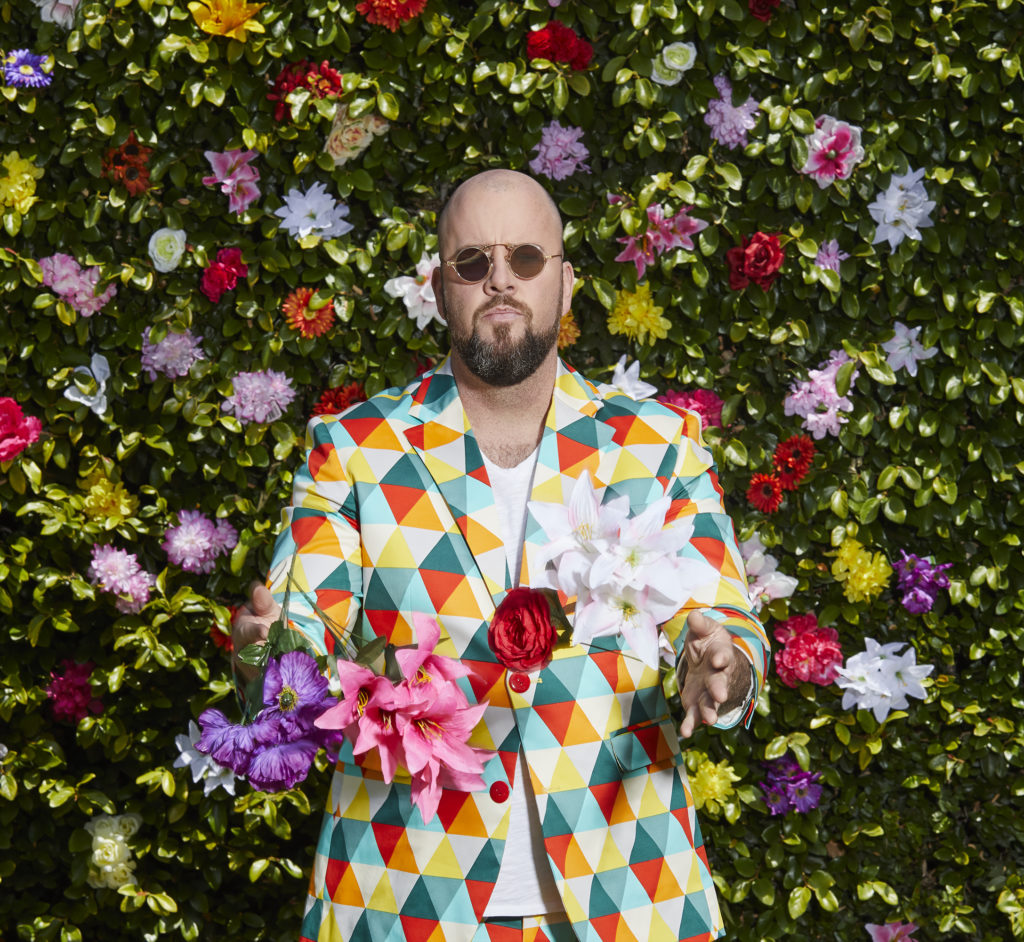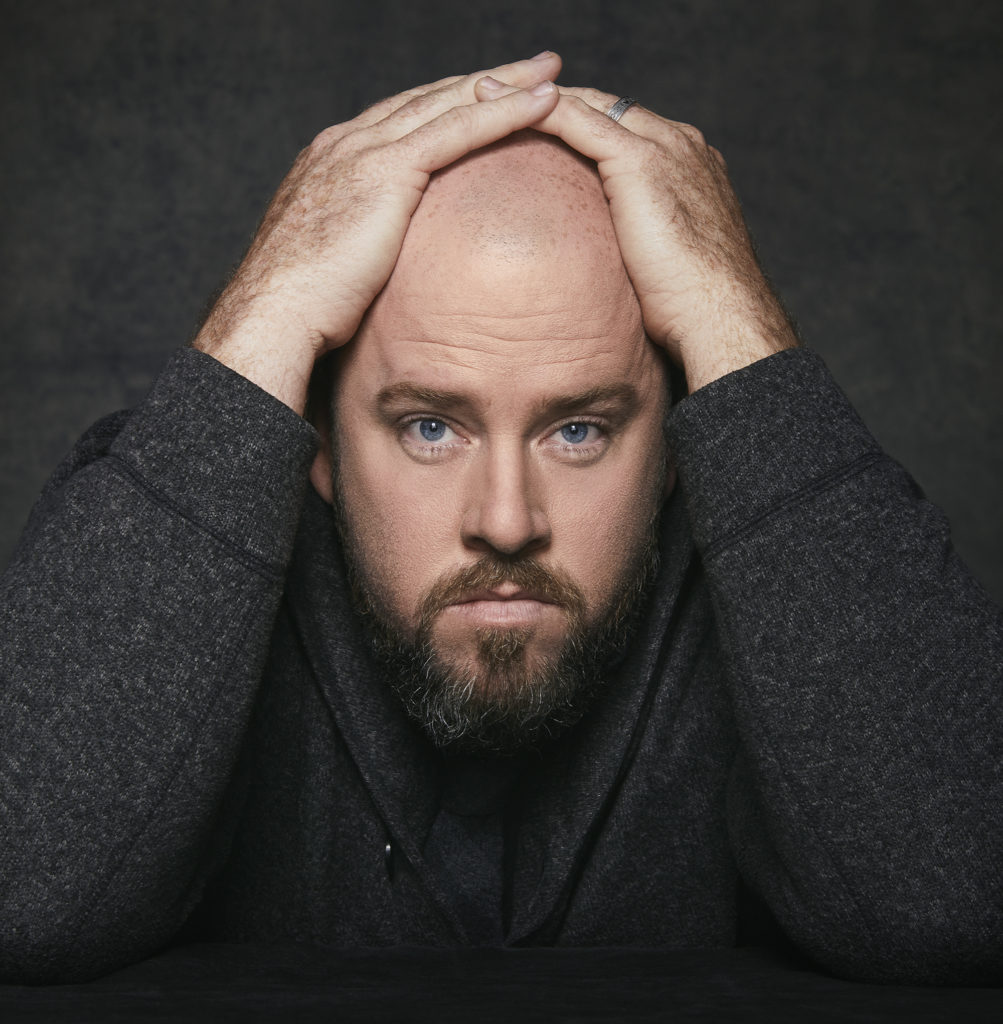

Exploring themes of hardship, regret, vulnerability and redemption, NBC’s smash hit “This Is Us” stands out as a cathartic alternative to the division and resentment driving today’s politics and media. Chris Sullivan, who studied theater in the College of Communication and Fine Arts, plays Toby, a likeable character struggling with depression who makes an “armor out of humor.” We spoke with him about his work as an actor, sudden fame, why he ditched social media, and the importance of what you wear. Sullivan was interviewed by writer Aaron Smith.
You have a major role in “This Is Us,” an enormously popular show entering its third season. Did you have any idea it would be such a breakout hit?
Thinking that far down the line is not something an actor is in the habit of doing — not when your job is to be in the moment, and the career can be so full of ups and downs and uncertainty. I knew when I read the pilot script that it was really good episodic television. But there are so many steps along the way to make a show successful — the support of the network and studio, the editing, the music — and our people are knocking it out of the park.
Why do you think the show has resonated with such a wide audience and with critics?
People, especially right now, seem to be in need of catharsis, and “This Is Us” is a kind of guidebook on vulnerability. The only path to becoming wholly human is through loss and through pain. Both those things sound devastating and like things to be avoided, but there is no avoiding them. It’s actually when we share those experiences and allow the people who love us to help process them, that we can transcend the pain and loss, and grow into the people we were meant to be.
So, you see your job as going beyond entertaining people?
Yes. My job as an artist is to accurately depict human relationship. Sometimes it’s violent, sometimes it’s loving, sometimes it’s combative. But I think that the job of any art, whether it’s film, television, painting or music, is to hold up an emotion for the audience and to force the audience to ask themselves what they feel, what they believe, what they think, to challenge them one way or another. Unsuccessful art produces no emotion.
“This Is Us” has been described as a tearjerker, but it has funny, silly moments, too. It has such an array of characters ad plot lines. There is something for almost everyone, it seems.
The beautiful subjectivity of art is that you and I can stand in front of the same painting and feel two totally different things. “This Is Us” is such a specific and nuanced painting — there is a way in for every audience member. I have noticed that the more specific the show becomes, the more universal it becomes. You would think you would want a nice broad piece of art so that it applies to as many people as possible, but I’m realizing that it’s the exact opposite.
You’ve said your character, Toby, makes an “armor out of humor” as he battles depression. He continues to evolve. Do you bring any of your own experiences to the portrayal?
There are very few successful funny people who aren’t profoundly sad. As for Toby and all the characters, our writers are laying it all on the line. We have such a diverse writers’ room. There are older white men and younger black women and LGBT community members and people in recovery. The show is about real things that have happened to real people. Some of the actors suggest a few things here and there, but I didn’t have to — they’ve already put some of me in the show. Episode after episode, the writing is incredible.
With the show’s enormous popularity, what’s it like being recognized and approached by people you don’t know?
On the positive side, David Letterman put it best: “Fame makes the entire world a small town.” So everywhere you go, you have friends. We are lucky to have a show that brings out the best in people, so it makes for lovely interactions. On the other side, it’s hard sometimes to remain present with the people who I’m spending time with. I don’t want to ignore anyone who has had an emotional connection with the show, but I’m also trying to spend time with my wife or my friends, and a lot of times those interactions can leave them feeling a bit invisible. It can be a complicated moment to maneuver, but I’m getting better at it.
How do you engage with social media?
I don’t. I gave it up right before “This Is Us” started. It was already too large a part of my life, and I was not looking forward to what it might become after the show got popular. I haven’t been active on Facebook for a couple years, I shut down my Instagram, and I handed my Twitter account over to someone else to run, though I still provide occasional content.
How has that changed things?
I’m far more productive. I have a far more clear and present attitude about moving through my day, and I don’t find myself as angry. I don’t think that any of the social media platforms are structured to engage people through love and kindness. They are set to entice people though conflict, and shock and awe. I need my energy for other things.
“We are lucky to have a show that brings out the best in people, so it makes for lovely interactions. On the other side, it’s hard sometimes to remain present with the people who I’m spending time with.”
Are there specific artists you hope to work with in the future?
I would love to work with the Duplass brothers in any capacity. [As directors, writers and actors, Mark and Jay] put out some of the most sincere work I’ve seen. And I want to work with people who scare me — Tracy Letts, Kathryn Hahn — people who are doing things on screen that make me say, “How the [heck] do you do that?!” I want to get close and see what they’re doing. I want to work with the entire cast of “Three Billboards Outside Ebbing, Missouri.” Jill Soloway is an incredible artist, and “Transparent” is one of the most important television shows ever made.
Did you have a favorite actor growing up?
Tom Hanks. Even to this day, he is someone to be admired. He seems to have led a successful, sincere, heartfelt life. And “The X-Files” was the first show I ever obsessed over. As fate would have it, one of the writers, Valerie Mayhew, gave me my first professional job — a Westwood church production of “The Fantasticks.” It paid $150 a week.
What brought you to LMU almost 20 years ago?
I went to Jesuit High School [in Sacramento] and was quite fond of the educational style. Even as a teenage boy who fought against school, I appreciated my professors who were in the order, especially Mark Zangrando, who ended up at LMU as well. LMU had a good theatre program and offered me a scholarship to play tennis. It was a perfect fit.
Tennis and theater are very different career paths.
Professional actor, professional athlete — they both have such a high rate of success! Tennis had me waking up at 5 in the morning and theater had me staying up until midnight. Between those two activities and classes, I had a bit of a breakdown halfway through freshman year. My body was starting to fight against the tennis, with shoulder and knee injuries, and that made my decision clearer but definitely not easy.
Do you still play?
Once in a while. It’s more of a meditation exercise in letting the ego die, as I’m not able to do the things I once was.
Acting turned out well. How did LMU’s theatre arts program help?
The program didn’t just allow but required active involvement from the beginning. And it wasn’t just acting, there was directing and stagecraft and lighting design and stage management — all the different aspects that go into theater. I wanted to be an actor, but I got a very well-rounded understanding of how theater works and what it takes to produce a show. It made the experience really enjoyable. Other schools that I got into, like UCLA, didn’t allow students to perform until their junior year, and I didn’t want to wait that long.
When did you discover that you loved acting?
Ed Trafton, the theater director at Jesuit High School, was an incredible mentor, not only for me but many people, including Greta Gerwig. He was the first adult to treat me like an artist. He taught me the nuances of theater. Acting was an organized activity to channel my lifelong pursuit of disruptive energy. It gave my need to move and make noise a costume and emotional direction. It was a match made in heaven.
If acting hadn’t worked out, what would you be doing now?
My minor at LMU was a certificate program for dependency counseling. I might enjoy some form of counseling or teaching.
You also have a band called Sully and the Benevolent Folk.
Yes, I’m currently writing material for a second record with LMU alum Ben Kaplan ’01. I’m also writing songs with Taylor Goldsmith, the lead singer for the band Dawes. I’m trying to figure out what having a record at this point in my career means — maybe a small tour, maybe shows around Los Angeles.
You sport some rather eccentric, colorful outfits. Do you have a stylist?
Hit or miss, the clothes are mine. I’ve tried to figure out why I dress the way I do. There’s a business [interest] as far as standing out in a city of people who stand out. There’s a humor factor as far as not taking any of this too seriously. [Fashion icon] Iris Apfel is my fashion spirit animal. She says, “If you don’t dress like other people, you don’t have to think like other people.”
